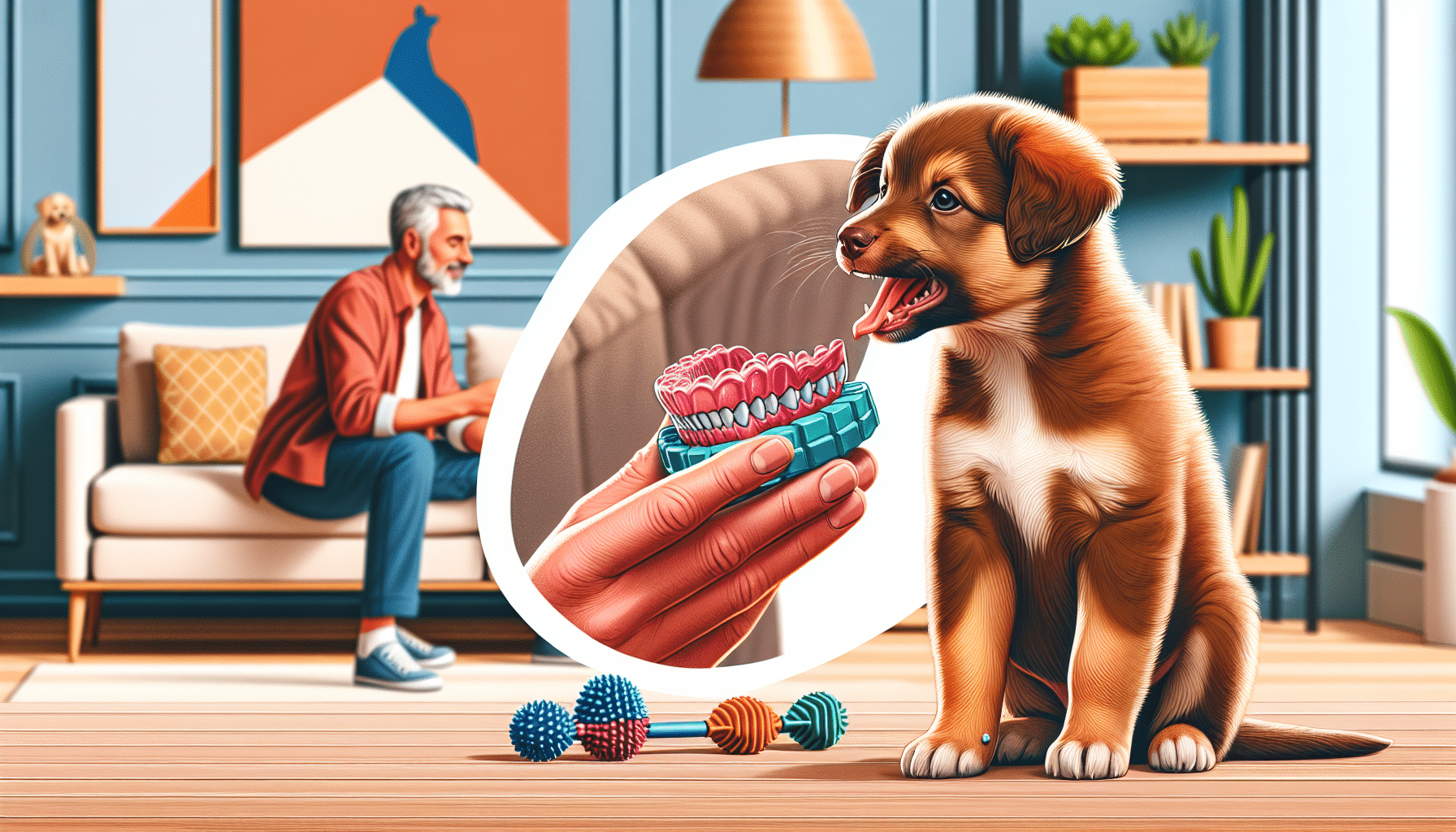If you've recently welcomed a sweet, little puppy into your life, you may have already encountered the joys of puppy teething and chewing. While it can be a challenging phase, it's important to remember that it's a natural part of your puppy's development. In this article, we'll provide you with some valuable tips and tricks to help you manage this stage and save your furniture from becoming a casualty of teething. So, grab a cup of coffee, sit back, and let's dive into the world of puppy teething together!

This image is property of images.pexels.com.
Understanding Puppy Teething
What is puppy teething?
Puppy teething is a natural process that occurs when a puppy's baby teeth are replaced by their permanent adult teeth. Just like human babies, puppies go through this teething phase, which can be a bit uncomfortable for them. During this time, puppies will experience discomfort in their gums, leading them to chew on anything they can find to alleviate the pain.
When does puppy teething occur?
Puppy teething typically begins when your furry friend is around three to four months old and lasts until they are six to seven months old. This is the time when their baby teeth start falling out, making room for their adult teeth to come in. It is essential to understand that every puppy is different, so the timing may vary slightly.
Why do puppies chew during teething?
Puppies chew during teething to ease the discomfort caused by their erupting adult teeth. The pressure from chewing helps alleviate the pain as their teeth break through their gums. It is important to provide appropriate chew toys to redirect their chewing behavior and prevent them from damaging your belongings.
Signs of Puppy Teething
Excessive chewing
One of the most common signs of teething in puppies is excessive chewing. You may notice your puppy gnawing on furniture, shoes, or even your hands. This behavior helps them relieve the pressure and discomfort in their gums.
Bleeding gums
During the teething process, a puppy's gums may become sensitive and even bleed slightly. This can occur when the baby teeth are falling out, and the adult teeth are erupting. If you notice any significant bleeding or extreme discomfort, it is best to consult a veterinarian.
Loss of appetite
Teething can cause some puppies to experience a temporary loss of appetite. The discomfort in their mouth may make it challenging for them to eat regular meals. However, as long as they are drinking water and their appetite returns within a day or two, there is usually no cause for concern.
Irritability
Teething can also make puppies feel irritable and easily annoyed. They may exhibit signs of being more temperamental or even aggressive than usual. It is crucial to be patient and understanding during this phase and provide them with appropriate outlets for their discomfort.
Excessive drooling
Increased drooling is another sign of puppy teething. As their gums become more sensitive, puppies naturally produce more saliva. You may notice more wet spots around the house or excessive drooling while they sleep or chew.

This image is property of images.pexels.com.
Teething Toys
Choosing appropriate teething toys
When selecting teething toys for your puppy, it is crucial to choose safe and appropriate options. Look for toys specifically designed for teething puppies, as they are made to be durable and gentle on their gums. Avoid toys that are too hard or small, as they may pose a choking hazard or damage their teeth.
Types of teething toys
There are various types of teething toys available for puppies. Rubber and silicone toys are popular choices since they provide a satisfying texture for chewing. Rope toys can also be effective, as they allow puppies to gnaw and pull while promoting dental health. Additionally, frozen teething toys can provide extra relief by numbing their gums.
How to introduce teething toys to your puppy
To introduce teething toys to your puppy, let them explore and play with the toys in a calm and relaxed environment. Encourage them to chew on the toys by praising and rewarding them when they do. It may take some time for them to understand that the toys are meant for chewing and relieving their teething discomfort.
Cold Compresses and Ice Cubes
Using cold compresses for teething pain
Cold compresses can be an effective way to reduce teething pain for puppies. You can make a cold compress by wrapping a clean cloth or towel around a few ice cubes. Gently apply the cold compress to your puppy's sore gums, providing temporary relief from the discomfort.
Using ice cubes for teething pain
Another simple and natural method is to give your puppy ice cubes to chew on. The coldness of the ice cubes helps numb their gums, providing them with instant relief. However, it is essential to supervise your puppy while they chew on ice cubes to prevent choking or excessive cold exposure.

This image is property of images.pexels.com.
Interactions and Distractions
Redirecting chewing behavior
When your puppy starts chewing on inappropriate items, it is crucial to redirect their behavior to more appropriate options. Keep a close eye on them and intervene by offering a teething toy when you catch them in the act. Praise them when they chew on the toy, reinforcing the positive behavior.
Teaching bite inhibition
Teaching your puppy proper bite inhibition is essential during the teething phase. Encourage gentle play and discourage any biting or nipping that exceeds an acceptable level of pressure. This helps them learn to control their bite strength and prevents accidental injuries as they grow.
Providing alternative activities
In addition to teething toys, providing alternative activities can help keep your puppy occupied and reduce their need to chew excessively. Consider introducing puzzle toys, treat dispensers, or interactive games that engage their minds and redirect their focus away from chewing.
Feeding and Nutrition
Choosing appropriate puppy food
During the teething phase, it is important to choose appropriate puppy food that supports their overall health and dental development. Look for high-quality puppy food specifically formulated for their age and breed size. Ensure that the food is easy to chew and provides the necessary nutrients for their growing bodies.
Providing chewy treats
Chewy treats can be a great snack for teething puppies. Opt for treats that are specifically designed for dental health or those that are designed to be soft and chewy. These treats can help soothe their gums while also promoting dental hygiene.
Feeding frozen treats
Feeding frozen treats can provide relief to your teething puppy while also offering a refreshing treat. You can freeze wet food or make homemade frozen treats using ingredients like plain yogurt or mashed fruits. The coldness helps numb their gums, while the treat itself provides a tasty distraction.

Dental Care
Introduction to dental hygiene
Introducing dental hygiene to your puppy from an early age can help prevent oral health issues down the line. Get your puppy accustomed to having their mouth touched and inspected by gently lifting their lips and examining their teeth and gums regularly. Make it a positive experience by rewarding them with praise and treats.
Brushing your puppy's teeth
Brushing your puppy's teeth is an essential aspect of dental care. Start by using a soft-bristled toothbrush and puppy-friendly toothpaste. Gradually introduce brushing by first allowing them to lick the toothpaste and then slowly moving towards brushing their teeth. Aim to brush their teeth at least a few times a week to maintain good oral health.
Using dental chews or treats
Dental chews or treats are specifically designed to promote dental health and reduce tartar and plaque buildup. Look for products that are labeled as beneficial for dental care and approved by veterinary professionals. These chews or treats can help keep your puppy's teeth clean and support their overall oral hygiene.
Training and Socialization
Positive reinforcement training
Teething puppies can sometimes exhibit challenging behaviors, but positive reinforcement training techniques can help shape their behavior. Reward desired behaviors, such as chewing on appropriate toys, with treats and praise. Avoid punishment or scolding, as it can create fear or anxiety, hindering their development.
Socializing your puppy
During the teething stage, it is crucial to continue socializing your puppy. Expose them to various environments, people, and other dogs to help them become well-adjusted adults. This exposure also provides mental stimulation and can help redirect their energy away from excessive chewing.
Training games for teething puppies
Engaging your teething puppy in training games can be a great way to keep them mentally stimulated and prevent excessive chewing. Teach them basic commands like "sit," "stay," or "leave it" and incorporate them into fun games. This not only helps with their training but also provides a positive outlet for their energy.

Preventing Destructive Chewing
Puppy-proofing your home
To prevent destructive chewing, it is important to puppy-proof your home. Remove any valuable items or objects that may be tempting for your puppy to chew on. Keep electrical cords, shoes, and small objects out of their reach, and provide them with enough appropriate chew toys to redirect their chewing behavior.
Using bitter sprays or deterrents
If your puppy continues to chew on forbidden items, consider using bitter sprays or deterrents. These products have a taste that puppies find unpleasant, discouraging them from chewing on sprayed surfaces. Always check that the products are safe for puppies and follow the instructions carefully.
Supervising and confining your puppy
Supervision is crucial during the teething phase. When you cannot actively supervise your puppy, consider confining them to a puppy-proofed area or crate. This prevents them from accessing items they should not chew on and allows you to redirect their behavior more effectively when you're present.
Seeking Veterinary Assistance
When to consult a veterinarian
While puppy teething is a natural process, there are instances when it is necessary to consult a veterinarian. If your puppy's teething seems excessively painful, they experience persistent bleeding gums, or show signs of infection or illness, it is best to seek professional veterinary assistance. Your veterinarian can provide appropriate treatment and advice to ensure your puppy's oral health.
Professional dental cleaning
As your puppy grows, professional dental cleanings under anesthesia may become necessary. Regular dental cleanings help prevent tartar buildup and maintain healthy teeth and gums. Consult with your veterinarian to determine the appropriate timing and frequency for professional dental cleanings for your puppy.
Identifying oral health issues
Puppy teething also provides an opportunity to identify any potential oral health issues early on. Regularly examine your puppy's teeth and gums for signs of dental problems, such as tooth decay or gum disease. If you notice any abnormalities, consult your veterinarian for guidance and treatment options.
Remember, teething is just a temporary phase in your puppy's development. With patience, proper care, and appropriate outlets for their chewing, you can help your puppy navigate through this stage more comfortably. By understanding and addressing their teething needs, you can ensure their oral health and promote a positive lifelong relationship with your furry friend.


